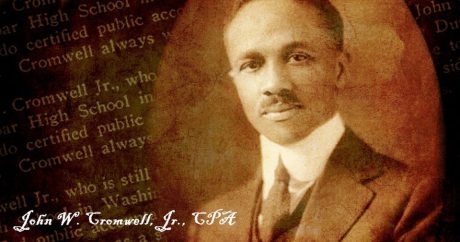
Black History Month is a time to acknowledge and celebrate the achievements of the African American community and their role in U.S. history. While the most popular celebrations tend to focus on political activists, authors, or musicians, it is just as important to recognize lesser-known roles. We will use this month as an opportunity to celebrate African-Americans who trailblazed the accounting profession.
There is no better place to begin this celebration than by focusing on the life of America’s first Black CPA: John W. Cromwell, Jr. In 1883, Cromwell was born to John W. Cromwell, Sr. and Lucy McGuinn. Cromwell’s father was born into slavery and bought his family’s freedom in 1851. Thereafter, he took on many roles, including lawyer, journalist, and civil rights activist in Washington D.C.
Cromwell followed in his father’s hardworking footsteps and graduated with honors from Dartmouth College in 1906, obtaining his master’s degree the following year. Since he was not allowed to sit for the CPA exam in D.C.—or any other surrounding state—he began teaching high school math.
It wasn’t until New Hampshire passed a law in 1921 waiving the experience requirement to sit for the exam, that Cromwell became licensed. From there, he continued to teach while practicing as an accountant in his own firm in D.C. His clientele primarily consisted of members of the black community. In 1930, he became comptroller of Howard University.
While Cromwell’s achievement was a significant moment in history, it still took another 45 years for the first 100 black accounts to be licensed. Of the first 100, 28 were licensed in Illinois alone, which meant most of the country was staggeringly nonprogressive. By the time the National Association of Black Accountants was founded in 1969, there were only 136 black CPAs. When Cromwell passed away at the age of 88 in 1971, that number had hardly grown.
Even today, black accountants only represent approximately 2% of all licensed CPAs in the United States. In our mission to support and encourage a more diverse field, it is continuously important that we take time to recognize pioneers like John Cromwell.
